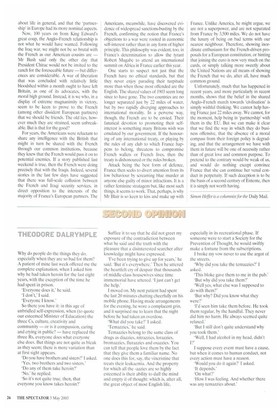THEODORE DALRYMPLE
Why do people do the things they do, especially when they are so bad for them? A patient of mine last week offered me the complete explanation, when I asked him why he had taken heroin for the last eight years, with the exception of the time he had spent in prison.
'Everyone does it,' he said.
'I don't,' I said.
'Everyone I know.'
So there you have it; in this age of unbridled self-expression, when (to quote our esteemed Minister of Education) the three Cs, culture, creativity and community — or is it compassion, caring and crying in public? — have replaced the three Rs, everyone does what everyone else does, But things are not quite as bleak as they seem; there is more variation than at first sight appears.
'Do you have brothers and sisters?' I asked. 'Yes, two brothers and two sisters.' 'Do any of them take heroin?'
'No,' he replied.
'So it's not quite true, then, that everyone you know takes heroin?' Suffice it to say that he did not greet my exposure of the contradiction between what he said and the truth with the pleasure that a disinterested searcher after knowledge might have expressed.
'I've been trying to give up for years,' he said. 'But it's everywhere.' Then he uttered the heartfelt cry of despair that thousands of middle-class housewives since time immemorial have uttered. 'I just can't get the help.'
I moved on. My next patient had spent the last 20 minutes chatting cheerfully on his mobile phone. Having made arrangements for the evening, he wore a complacent grin, and it surprised me to learn that the night before he had taken an overdose.
'What did you take?' I asked. `Temazzies,' he said.
Temazzies belong to the same class of drugs as diazzies, nitrazzies, lorazzies, bromazzies, flurazzies and oxazzies. You can tell that people love them by the fact that they give them a familiar name. No one does this for, say, the vincristine that treats their leukaemia. And the property for which all the -azzies are so highly esteemed is their ability to dull the mind and empty it of thought: which is, after all, the great object of most English life, especially in its recreational phase. If someone were to start a Society for the Prevention of Thought, he would swiftly make a fortune from the subscriptions.
I broke my vow never to use the argot of the streets.
'Why did you take the temazzies?' I asked.
'This bloke gave them to me in the pub.' 'But why did you take them?'
'Well yes, what else was I supposed to do with them?'
'But why? Did you know what they were?'
'I'd seen him take them before. He took them regular, by the handful. They never did him no harm. He always seemed quite relaxed.'
'But I still don't quite understand why you took them.'
'Well, I had alcohol in my head, didn't I?'
I suppose every event must have a cause, but when it comes to human conduct, not every action must have a reason.
'Would you do it again?' I asked. 'It depends.'
'On what?'
'How I was feeling. And whether there was any temazzies about.'










































































 Previous page
Previous page